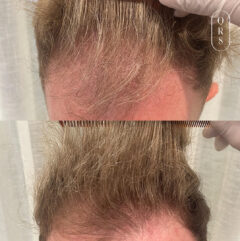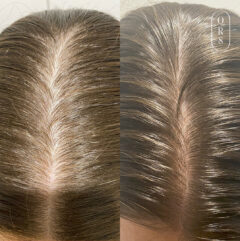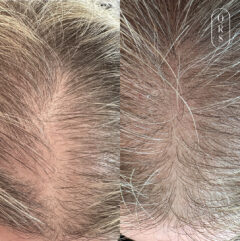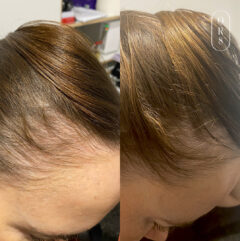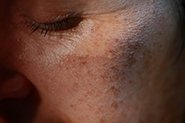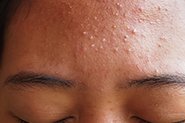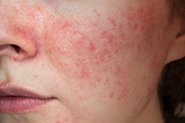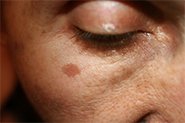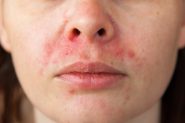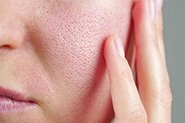

Written by Qr8 Founder Dr Michele Squire
Fact Checked by Dr Ambi Sud
You may have heard about a possible connection between GLP-1 medications and hair loss. The U.S. Food and Drug Administration has recently identified drug-induced alopecia (hair loss) as an adverse event for patients taking GLP-1 medications.
These drugs are relatively new to the market, so the research underpinning their adverse effects is scarce, especially their impact on hair. Some people using these treatments report no changes in their hair, while others notice increased shedding. Some studies suggest a potential link, while others provide limited evidence. Even though the scientific data remains inconclusive, anecdotal evidence suggests that there is some effect on hair health in individuals taking these medications.
Understanding this connection is crucial, as hair loss may not be a direct result of the medication. It may be that indirect effects such as the rapid weight loss, hormonal changes, and nutritional deficiencies linked to these medications affect your hair health. Exploring these factors helps you make informed decisions about managing hair loss and treatment options while using GLP-1 therapies.
Understanding GLP-1 and its Role in Weight Regulation: The Role of natural GLP-1 in the Body
GLP-1, glucagon-like peptide-1, is a naturally-occurring hormone that helps regulate your blood sugar levels, appetite and maintain glucose balance. It signals the pancreas to produce insulin secretion when blood sugar levels rise. It also helps the specific cells in your pancreas that produce insulin survive for longer. GLP-1 also inhibits glucagon secretion when glucose levels are high, which prevents unnecessary sugar release into your bloodstream.
GLP-1 Medications and Their Uses
GLP-1 medications mimic the natural actions of GLP-1 in your body (hence the name GLP-1 agonists). They stimulate your pancreas to release more insulin when blood sugar levels are elevated. They also suppress appetite by stimulating the body’s production of your own naturally-occurring GLP-1, which helps you feel full for longer periods. This effect reduces your appetite and overall food intake, making them effective as part of weight loss programs. Doctors often prescribe GLP-1 medications for managing type 2 diabetes and obesity. By improving both blood sugar control and supporting weight management, these treatments can significantly enhance your overall health.
GLP-1 agonists include (not all are available in Australia): semaglutide (brand names Ozempic, Wegovy, Rybelsus), liraglutide (Saxenda, Victoza), dulaglutide (Trulicity), exenatide (Byetta, Bydureon) and lixisenatide (Lyxumia, Adlyxin). It also includes the gastric inhibitory polypeptide GIP/GLP-1 agonist, tirzepatide (Mounjaro).
The use of these drugs has exploded worldwide in recent years. There’s no accurate Australian data available (the companies who manufacture the drugs don’t release their sales figures) but there was an increase in monthly prescriptions in the U.S. from 400,000 to >1.6 million between 2015 and 2020.
Common Side Effects of GLP-1 Medications
Like any medication, GLP-1 treatments may cause side effects, which is why a real-time medical consultation, and ongoing monitoring by experienced doctors, are needed to ensure they are appropriately prescribed. The most common adverse effects include nausea, vomiting, and diarrhoea or constipation. Severe and potentially life-threatening reactions like pancreatitis, bowel obstruction or infection of the gallbladder are also possible, although less common.
See Dr Michele and Dr Ambi chat all things hair loss on our instagram!
Potential Mechanisms of Hair Loss with GLP-1 Medications
Several biological mechanisms might explain why GLP-1 medications could lead to hair loss. Rapid weight loss, a common outcome of these treatments, can place stress on your body. This increases production of the stress hormone cortisol which disrupts the normal hair growth cycle. This can impair the activity of stem cells in your follicles, slowing regeneration of new hair. This may push hair follicles into the resting phase, causing increased hair shedding, a condition known as telogen effluvium (TE) . TE has previously been reported in patients following weight loss (bariatric) surgery. Typically, onset of hair loss is 2-4 months after the triggering event.
Hormonal shifts triggered by these drugs could also affect the health of your hair follicles.
Additionally, changes in eating habits due to reduced appetite might result in nutritional deficiencies. A lack of essential nutrients like zinc, and iron, and reduced protein intake, can weaken hair and slow its growth.
These factors suggest that hair loss may not directly result from GLP-1 medications but rather from the changes they induce in your body, but more research is needed to fully understand the connection.
Managing and Preventing Hair Loss whilst using GLP-1 Drugs
Lifestyle and Diet Changes that can help with hair loss:
1.Eat Nutrient-Rich Foods
Make sure to get enough protein, iron, and vitamins like iron and zinc by including foods like eggs, nuts, and leafy greens in your diet. Many people following weight loss plans (including intermittent fasting or the keto diet) need to be mindful of nutrient intake for strong hair and hair growth. Ensuring your protein intake is sufficient (especially around perimenopause/menopause) by including a variety of lean meats, fish, legumes and seeds in your diet. This is because protein forms the building blocks of keratin, the primary component of hair.
Maintaining a balanced diet may be tricky where side effects (such nausea) are persistent – consider speaking to your doctor about supplements, such as a multivitamin, if you are taking GLP1-1 drugs.
2. Stress Management Techniques
Managing stress through activities like yoga, meditation, and regular exercise can help reduce stress-related hair loss. Prioritising quality sleep also supports hormonal balance, which benefits your hair.
3. Be Gentle with Your Hair
Tight hairstyles and harsh chemicals (such as those found in hair bleach and dyes) can cause additional damage, so take care to avoid these.
What if I’m doing these things and still losing hair?
Always ask a doctor for advice personalised to you – it may be that something else other than weight loss is causing your hair loss, and early treatment for hair loss generally leads to better outcomes. Effective medical hair loss and regrowth solutions are available, so you can maintain healthy hair while achieving your health goals.
1. Minoxidil and Finasteride:
Medical treatments can effectively address hair loss when prescribed appropriately.
Minoxidil, a topical treatment, widens blood vessels in the scalp. This improves blood flow to hair follicles, slowing hair loss and encouraging regrowth. It works best in the early stages of hair thinning/balding, and can be used by both men and women. It is particularly effective when combined with another topical prescription medication, tretinoin, to enhance its absorption (and means that it can be applied once daily versus the normal twice daily application, and without the use of microneedle devices).
Finasteride, an oral medication used for men only, blocks the conversion of testosterone into dihydrotestosterone (DHT). Over time, DHT causes hair follicles to shrink in individuals who are genetically prone to DHT sensitivity. Eventually, the follicles stop growing new hairs. Reducing DHT levels prevents further hair thinning and promotes regrowth. Both treatments require consistent use for noticeable results.
2. More Invasive Treatments:
Other options include steroid injections and platelet-rich plasma (PRP) therapy. PRP involves injecting plasma from your blood into the scalp to stimulate hair growth. These treatments can be effective, but you should consult a healthcare professional to determine the best approach for your needs.
FREQUENTLY ASKED QUESTIONS
No definitive evidence links GLP-1 medications to direct hair loss. However, rapid weight loss or nutritional deficiencies caused by these treatments may trigger temporary shedding, such as telogen effluvium.
Monitor the timing of your hair loss. If shedding begins within a few (2-4) months after starting GLP-1 therapy , it might be related. Factors like weight loss, stress, or dietary changes could also contribute. A healthcare professional can provide clarity.
Do not stop your medication without consulting your doctor. They can assess whether the treatment is causing hair loss and suggest adjustments, treatments or supplements to address the issue.
Acting EARLY is vital for best results. If you see hair loss, talk to a doctor to diagnose and treat the cause of existing hair loss, recommend further tailored treatments to regrow hair or prevent further hair loss. They can also provide access to prescription-only therapies for hair restoration.
WE SEE YOU. WE UNDERSTAND YOUR FRUSTRATION WITH FINDING SOLUTIONS FOR HAIR THINNING AND HAIR LOSS.
WE’RE HERE TO HELP.
BOOK A CONSULTATION WITH AN EXPERIENCED AUSTRALIAN DOCTOR TODAY TO DISCUSS YOUR TREATMENT OPTIONS: CLICK HERE
REFERENCES:
Hamblin PS, Earnest A, Russell AW, Talic S, Zomer E, Zoungas S. Utilization and cost of non-insulin glucose-lowering drugs in Australia from 2013 to 2023. Diabetes Obes Metab. 2024 Nov;26(11):4924-4932. PMID: 39219539.
Potential signals of serious risks/new safety information identified by the FDA adverse event reporting system (FAERS). FDA [Internet]. 2024 Jan 2 [cited 29 Jan 2025; Available from: https://www.fda.gov/drugs/questions-and-answers-fdas-adverse-event-reporting-system-faers/july-september-2023-potential-signals-serious-risksnew-safety-information-identified-fda-adverse
Godfrey H, Leibovit-Reiben Z, Jedlowski P, Thiede R. Alopecia associated with the use of semaglutide and tirzepatide: A disproportionality analysis using the FDA adverse event reporting system (FAERS) from 2022 to 2023. J Eur Acad Dermatol Venereol. 2025 Feb;39(2):e153-e154. PMID: 38925559.
Burke O, Sa B, Cespedes DA, Tosti A. Glucagon-Like Peptide-1 Receptor Agonist Medications and Hair Loss: A Retrospective Cohort Study. J Am Acad Dermatol. 2025 Jan 23:S0190-9622(25)00126-4. PMID: 39863171.
Desai DD, Sikora M, Nohria A, Bordone L, Caplan AS, Shapiro J, Lo Sicco KI. GLP-1 agonists and hair loss: a call for further investigation. Int J Dermatol. 2024 Sep;63(9):1128-1130. PMID: 38741261.

